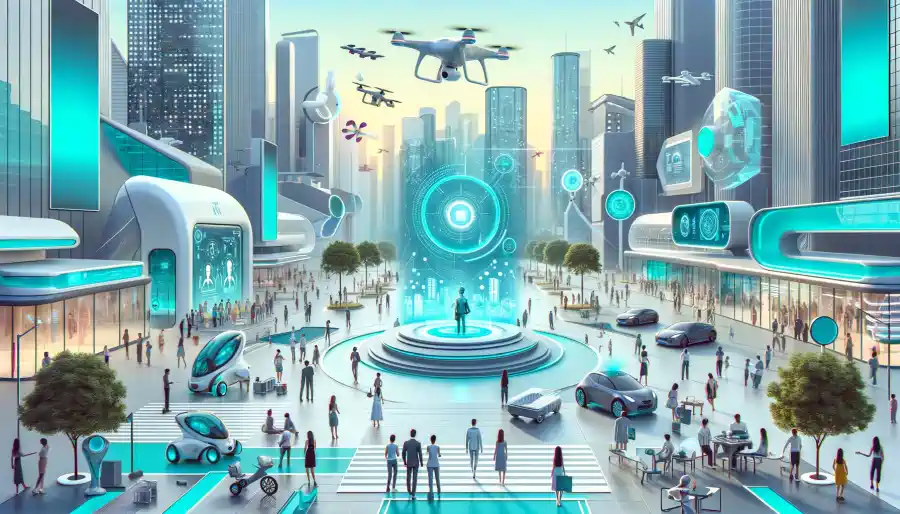AI in the future
Artificial Intelligence (AI) is on its way to becoming a powerful driving force in our future society. AI technologies, such as Microsoft Azure, Google LaMDA, IBM, and Amazon AI, have already started to transform our ways of working, communicating, and experiencing the world. But what does this mean for the future?
What is AI?
AI stands for Artificial Intelligence and describes technology where machines are capable of performing tasks that normally require human intelligence. AI encompasses a range of technologies such as machine learning, natural language processing, and computer vision.
What is Microsoft Azure?
Microsoft Azure is a cloud platform for developing and deploying AI solutions. It offers a range of AI tools and technologies, including machine learning, data analysis, and chatbots. Azure helps developers build intelligent solutions for businesses in a secure cloud-based infrastructure.
What is Google LaMDA?
Google LaMDA is a new AI technology initiative from Google, focusing on improving machines' ability to understand and generate language. LaMDA is one of the most advanced technologies in AI language technology and has the potential to revolutionize search and communication between humans and machines.
What AI technologies do IBM and Amazon have?
IBM and Amazon have both developed a range of advanced AI technologies. IBM is known for its Watson technology, used to help answer questions and solve complex problems. Amazon has its Alexa AI technology, which can be used to control a range of devices and make daily tasks easier. Both companies continue to invest in AI technology and bring new solutions to the market.
Advantages of AI
AI has many advantages that can improve our lives and society. Some of the most striking advantages of AI include:
- Increased efficiency: AI technologies can automate manual tasks, which can increase productivity and save time and money.
- Better decisions: AI can analyze large amounts of data and provide more precise and quick decisions than humans.
- Improvement in quality of life: AI can help diagnose and treat diseases, as well as assist the elderly and disabled in living more independent lives.
Disadvantages of AI
Although AI has many advantages, there are also some disadvantages to consider. Some of the most serious disadvantages of AI include:
- Unemployment: AI can automate many jobs and result in unemployment.
- Privacy and security: AI can also be used to monitor and track people, which can lead to a threat to privacy.
- Bias: AI is only as good as the data it is trained on, and if the data is biased, AI can also be biased.
- Deep fake: Videos, images, etc., that have never occurred can be created, which can be used to deceive, for example, voters or consumers.
ChatGPT
An interesting AI technology showing the potential for the future with AI is ChatGPT, a communication AI that can chat with people in a natural way. ChatGPT was invented by OpenAI and has already proven to be very advanced, as it can answer questions and hold conversations with people.
We have written a blog post about how ChatGPT can be used for SEO and marketing
Google Gemini
Google has also created a chatbot built on their AI. This is called Google Gemini and due to their vast knowledge in internet searches, it is very good at finding quick answers on the net, thereby being able to provide completely up-to-date information.
Read more about Google Gemini
Future Expectations for Artificial Intelligence
Artificial Intelligence (AI) has made significant strides in recent years and transformed how we live, work, and interact with the world around us. From autonomous vehicles to automated customer service solutions, AI has already made its presence felt in many aspects of our daily lives. But what can we expect from AI in the future?
Revolutionizing the Healthcare Sector
AI has the potential to revolutionize the healthcare sector by offering precise diagnoses, personalized treatment, and improved patient care. Using deep learning algorithms, AI-assisted systems can analyze vast amounts of medical data faster and more accurately than ever before, leading to quicker and more precise diagnoses.
Optimization of Smart Cities
AI will play a central role in the development of smart cities, where it can be used to optimize traffic management, energy consumption, and waste management. By analyzing data from a variety of sensors, AI can help create more sustainable and efficient urban environments.
- Improved traffic flow and reduced traffic jams
- Intelligent energy management in homes and businesses
- Efficiency in waste management through predictive analysis
Advancements in Education
AI also has the potential to transform the education sector by offering personalized learning experiences and streamlining administrative processes. AI can tailor the learning material to individual students' needs and progress, which can significantly improve learning outcomes.
Many Areas
We have let the AI give an idea of how it will illustrate the AI of the future and this can be seen here

In summary, it is clear that AI will continue to have a profound impact on nearly every aspect of our lives. As we move into the future, the continued development and implementation of AI technology will inevitably lead to significant advancements and improvements across a wide range of industries and societal functions.
Overall, the future with AI is both exciting and daunting. AI has the potential to revolutionize our society, but it is also important to consider the potential drawbacks, account for the risk of, for example, deep fakes, and ensure that AI is used responsibly.
AIChatGPTMicrosoft AzureGoogle LaMDAAI in the future